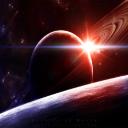Yahoo Answers is shutting down on May 4th, 2021 (Eastern Time) and the Yahoo Answers website is now in read-only mode. There will be no changes to other Yahoo properties or services, or your Yahoo account. You can find more information about the Yahoo Answers shutdown and how to download your data on this help page.
Trending News
Is the Big Bang really Science?
“‘Cosmology may look like a science, but it isn’t a science,’ says James Gunn of Princeton University, co-founder of the Sloan survey. ‘A basic tenet of science is that you can do repeatable experiments, and you can’t do that in cosmology.’”
Cho, Adrian, A singular conundrum: How odd is our universe? Science 317:1848–1850, 2007.
Josh - regarding the LHC - The whole reason the LHC exists is because the mathematics of the Standard Model of Cosmology doesn't work.
And I'm not sure it is useful to categorize all experiments that can be done in the Universe as Cosmology.
godless - yes I understand the rhetoric. It just doesn't qualify as proof or I would argue, even evidence for the origins of the universe. It does, however, prove to be increasingly difficult to pin down a purely naturalistic explanation of origins.
11 Answers
- ?Lv 69 years agoFavorite Answer
In my eyes, the big bang theory is a creation myth invented by a belgian priest and given the support of a god-fearing american scientific community. Throughout the last century observations kept cropping up that contradicted it and more and more fantastical concepts had to be invented to keep it alive; things like expanding space, inflation and dark energy. There are a few notable astronomers who recognise the absurdity of it — some of them give their views in this documentary which you may find interesting...
http://www.youtube.com/watch?v=1yTfRy0LT%E2%80%A6
That video also highlights the shameful amount of bias that exists amongst the scientific community. The professionals have to do big bang supporting research if they want to keep their jobs. So of course there is a lot of research supporting the big bang. It is not so much the evidence that supports the big bang but the conclusions that are drawn by scientific consensus. [see www.cosmology.info]
The truth is that the big bang theory is severely flawed and will likely be consigned to the history books within a decade or two. There is an increasing weight of evidence opposing it.
The best single contradicting observation is probably this:
http://www.thunderbolts.info/tpod/2011/arch11/1103...
...and here is some more:
http://www.dailygalaxy.com/my_weblog/2010/09/the-g...
http://phys.org/news190027752.html
http://www.astronomy.com/en/News-Observing/News/20...
http://www.spaceref.com/news/viewpr.html?pid=17752
http://www.thefreelibrary.com/Quasar+clumps+dim+co...
http://www.nytimes.com/1991/01/03/us/astronomers-n...
This page lists the many problems with the big bang theory:
http://www.metaresearch.org/cosmology/BB-top-30.as...
imo, the best alternative cosmologies are the plasma/electric universe theories:
www.plasmacosmology.net + http://www.thunderbolts.info/wp/resources/syn/
- 9 years ago
Science can also use observation verification to justify its' hypotheses. As long as there is an empirical bit of data justifying the conclusion, I would allow that it qualifies as science. Einstein's Theory of Relativity was confirmed by observation of a star's changed position that was caused by the bending of its' light around the sun. This wasn't really an experiment, because there were no variables that could be adjusted, but if you define science somewhat more broadly, and allow for observational verification as a legitimate method of empirically based study, than it is definitely a science.
- ?Lv 79 years ago
A scientific theory is a unifying concept that explains a large body of data. It is a hypothesis that has withstood the test of time and the challenge of opposing views. The Big Bang Theory is supported by extensive empirical data. There is no reliable data supporting the some-god-did-it hypothesis, and especially not the Yahweh-did-it hypothesis.
Six prominent facts supporting the Big Bang Theory are:
** The red shift of almost all galaxies, getting greater as their distance increases.
— This shows that the galaxies are flying away from each other, at greater speeds at greater distances.
** The cosmic microwave background radiation.
— This is a remnant of the radiation from the Big Bang, and has cooled over time to the exact temperature predicted.
** The variations in the cosmic microwave background radiation.
— These variations fit theoretical predictions, and were caused by quantum differences near the start of Big Bang.
** The proportions of the lightest elements and isotopes.
— This helps show that the calculations for nuclear interactions immediately following the Big Bang are correct.
** The changes in galaxies as we look further away (and thus back in time), with distant galaxies more primitive and having fewer heavy elements.
— This shows some of the changes in the universe since the Big Bang, and confirms the deep time of the universe.
** The change in the apparent speed of type 1a supernova as we look back in time, with distant supernova exploding more slowly.
— This shows that the light has been stretched out by the expansion of space over billions of years.
For more, watch the video at the 1st link - "A Universe From Nothing" by theoretical physicist Lawrence Krauss, read an interview with him (at the 2nd link), get his new book (at the 3rd link), or read an excerpt from his book (at the 4th link).
edit:
If you want proof, see mathematics or logic.
It used to be that science couldn't answer the question about the origin of the universe or of the Big Bang, but that didn't mean we should make up an answer (such as a god) and say that it was the cause. Within the last few decades scientists have discovered some good answers. Of course, a scientific explanation is more complex than simply saying, "God did it."
Quantum mechanics shows that "nothing," as a philosophical concept, does not exist. There is always a quantum field with random fluctuations.
There are many well-respected physicists, such as Stephen Hawking, Lawrence Krauss, Sean M. Carroll, Victor Stenger, Michio Kaku, Alan Guth, Alex Vilenkin, Robert A.J. Matthews, and Nobel laureate Frank Wilczek, who have created scientific models where the Big Bang and thus the entire universe could arise from nothing but a quantum vacuum fluctuation in the quantum field -- via natural processes.
In relativity, gravity is negative energy, and matter and photons are positive energy. Because negative and positive energy seem to be equal in absolute total value, our observable universe appears balanced to the sum of zero. Our universe could thus have come into existence without violating conservation of mass and energy — with the matter of the universe condensing out of the positive energy as the universe cooled, and gravity created from the negative energy. When energy condenses into matter, equal parts of matter and antimatter are created — which annihilate each other to form energy. However there is a slight imbalance to the process, which results in matter dominating over antimatter.
I know that this doesn't make sense in our Newtonian experience, but it does in the realm of quantum mechanics and relativity. As Nobel laureate physicist Richard Feynman wrote, "The theory of quantum electrodynamics describes nature as absurd from the point of view of common sense. And it agrees fully with experiment. So I hope you can accept nature as she is — absurd."
-
Source(s): http://tinyurl.com/y8j6tpa http://www.samharris.org/blog/item/everything-and-... http://www.amazon.com/Universe-Nothing-There-Somet... http://www.scientificamerican.com/article.cfm?id=u... http://www.godlessgeeks.com/WhyAtheism.htm#bigbang http://www.stellarhousepublishing.com/originsofchr... http://freethoughtblogs.com/wwjtd/2012/01/19/will-... http://www.atheismresource.com/2010/jesus-never-ex... http://www.godlessgeeks.com/JesusExist.htm - Anonymous9 years ago
What he meant was that you can't repeatedly observe the creation of more than one universe. Nevertheless, cosmological theories can and do make predictions that can be tested. So his claim that cosmology is not a science is an exaggeration at best.
Source(s): I revised my original response after reading the Science Magazine article from which the quote was taken. - JoshLv 69 years ago
Try telling that to Albert Einstein or Steven Hawking, technically any...any type of experiment that is preformed in this universe is part of Cosmology.
What do you think they are doing at the LHC,
I guess it boils down to this, I know a lot of scientist but I don't know any James Gunn...Anyone else ever heard of this guy that thinks Cosmology isn't a science
....is this a troll question? If it is you got me.
- MikeLv 79 years ago
hmmm... copied and pasted *straight* from the ''Creation Ministries International'' website.
A group of folks whose principals of ''lying about science - because jesus is the truth'' have repeatedly been shown to fall flat on their face...
hmmm...
I have a suspicion that this is yet another lie/ fabrication or ''quote taken grossly out of context''.
Lets see, shall we?
Hmmm... Oddly, I keep finding this quote in several creationist and religious-fervor websites - - but I cannot seem to find any actual searchable citation. And it seems that Dr Gunn has specifically *denied* making this statement.
And he seems to be entirely comfortable being identified *as* a cosmologist - when he received the Crafoord Prize in 2005 and the Peter Gruber Cosmology Prize - also in 2005.
Somehow, I suspect that once again, the creationist have decided that ''Lying for Jesus'' is better than ''Telling a Truth about Science''.
What do you think, hey?
Source(s): http://creation.com/cosmology-is-not-science-james... http://news.sciencemag.org/sciencenow/2005/01/27-0... http://www.iau.org/grants_prizes/gruber_foundation... - FitzLv 79 years ago
Evidence for the big bang:
a) Large-scale homogeneity
b) Hubble diagram
c) Abundances of light elements
d) Existence of the Cosmic Microwave Background Radiation
e) Fluctuations in the CMBR
f) Large-scale structure of the universe
g) Age of stars
h) Evolution of galaxies
i) Time dilation in supernova brightness curves
j) Tolman tests
k) Sunyaev-Zel'dovich effect
l) Integrated Sachs-Wolfe effect
m) Dark Matter
n) Dark Energy
o) Consistency
Yes, it's science.
- 9 years ago
as far as i can see it is a science as cosmologists are trying to prove/disprove a theory/hypotheses by collecting supportive/countering data for it and evaluating them - as i see the crationists as scientists as well.
- Opinion Part -
It pretty much all boils down to: We cant say with a final confidence that one or the other theory is right or wrong. So both are having their right of existence.
- Lola FLv 79 years ago
Bullshit. There are zillions of repeatable, and repeated, experiments in cosmology.









